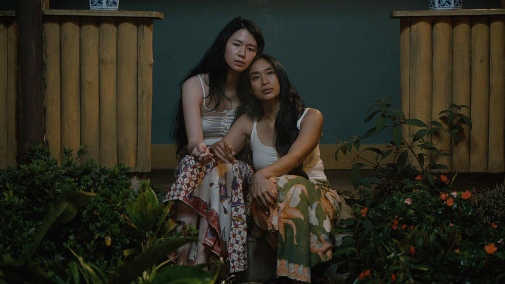
Indonesia's troubled history serves as backdrop for director Kamila Andini's latest feature. Adapted by Ahda Imran from her novel, Before, Now & Then sets its scene during the 1960s ascendancy of General Suharto, but the bloody strife is only perceived through gossip and radio, murmurs at the margins of privileged domesticity. Other older horrors live on within the intimacy of memory, influencing the lives of those without the power to change more than their fate. In some ways, the film is an example of classic melodrama in period costume. That said, its cultural specificities and an affinity between two women who should be at odds comprise a strong backbone that both supports and elevates the simple tale.
In 2022, this West Java-set narrative competed at the Berlin Film Festival, where Laura Basuki won the Silver Bear for Best Supporting Performance. Now, it arrives in American cinemas, in limited release…
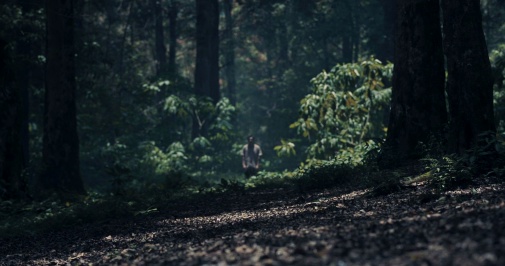
Somewhere in the Indonesian woods, two women make their way across the wilderness. One of them, Nana, keeps looking back from whence they came, spying a masculine figure, hazy in the distance. Does he chase them, or is he just watching? Perhaps he plans to harm them, though no action confirms those noxious notions. As we'll discover in time, it's not the ghost who chases Nana but she who holds on to him, the spectral remains of a husband lost in the same anti-communist violence that cost her father his life. The forest is full of memories, and they all come crashing down, death puncturing serenity as Nana wakes up - this time, it was only a dream.
When we meet her, the escaping woman is no longer on the run, and many years have passed since she trekked the aquamarine hinterland in search of salvation. Instead of panicking under a vaulted ceiling of treetops, she slumbers below a canopy of draped lace, her life marked by privilege unknown to most. One feels a great distance between these two versions of Nana, her years of struggle lost to the viewer. Yet, the woman subsumes whatever gap exists between her past and present. Though she may appear to move forward, Nana remains at a standstill within, so caught in bygone days, the now is but a mirage.
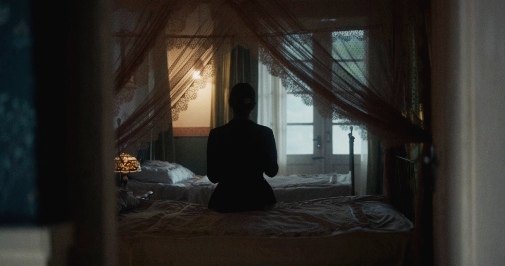
Walking through her gilded existence, she's a somnambulist befitting a woman's submissive role in a strongly patriarchal society. Inner thoughts remain unexpressed, a mystery she keeps to herself according to tradition. At her vanity, while styling long tresses, Nana passes these ways to her small daughter, the hair-care ritual complete with a lesson on a woman's need for discretion. Her secrets shall be kept close by, concealed, guarded by the back of her bun. In this and other scenes, Nana's voice resounds in airy remove. She speaks as if telling somebody else's story, distanced from her own life.
The sleepy haze of every day is interrupted by a missive from the village butcher, an intimate message from an unknown woman for Nana's older second husband, the source of her present affluence. Passing on the message, there's scant hostility in her tone. Instead, Nana is a picture of sedate resignation, with a glimmer of disappointment shining in the corner of her eye but little else in demonstrative reaction. Alone, displeasure flares brighter, never blinding. Later, at the dinner table, she stomachs the indignity but struggles to swallow the meat that arrives from the butcher mistress, tasting like betrayal.
But Before, Now & Then won't drive down the path of confrontation. In its place, Nana shall put aside wrath and meet with Ino, opening herself up to something far grander than rivalry. What could have been fractious soon becomes a precious bond built upon a foundation of sisterhood that takes Nana by surprise but seems natural to the free-spirited working woman. Through their friendship, the housewife savors the possibility of liberation, freeing herself from an edifice that's more gilded cage than home. Within its walls, the faithful Nana used to blend into the floral wallpaper, a ghost with a pulse. Now, she regains autonomy, inspired by a new friend.
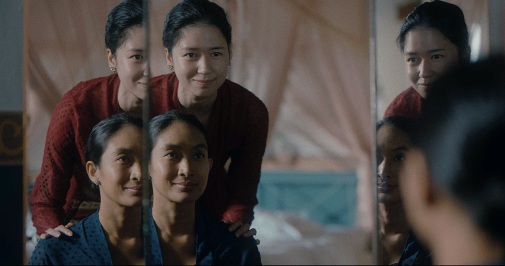
Leading lady Happy Salma does much to sustain the director's sotto voce approach to soap opera, where stylistic lushness holds hands with the quiet poetry of rebel hearts. Her talent for expressing much while doing very little is put to good use, with intense passages predicated on the tiniest gesture. Basuki's Ino is harder to pin down in terms of nature and actorly strategy. She feels more grounded than the character's description could suggest. She embodies the key to unlocking her friend's spirit above all else. She is a narrative device. She is also a person. It's testament to the actress' talent how complicated Ino comes across.
In Basuki's hands, the mistress is a three-dimensional personality whose life extends far beyond Nana's perspective. She's never merely an idea, and the viewer leaves the film feeling like her story wasn't fully resolved or even really told. Some bolder storytellers might have gone further and precipitated the Nana-Ino relationship into queer romance, but Before Now & Then remains platonic, ecstasy coming by strides for independence instead of carnal desires. And yet, watching the two women, you can't help but think of what a director like Wong Kar-Wai could have done with the material.
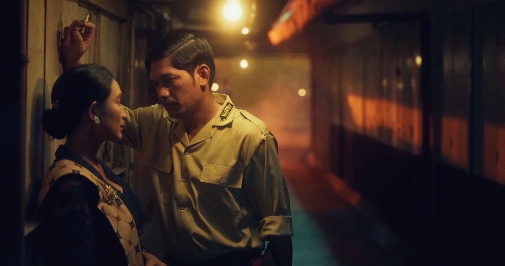
He'd surely have been more exuberant, doing away with the timidity that keeps Andini's film gentle to a fault. For those who find the comparison inappropriate, consider how entire sequences – the women's first face-to-face meeting, for example – seem to quote the Hong Kong master's style. It's not shameless copy, rather referential to the point of distraction, summoning the idea of a more interesting film than the one on screen. Or, perhaps, the path to glory would have seen an even more radical repudiation of dramatics, cutting out affectations like Ricky Lionardi's overbearing score. Or it would have foregrounded politics above character. Or, or, or.
Losing oneself in 'ors' 'what ifs' is silly business for critics and cinephiles alike. Film is an art and each project deserves to be met where they're at, not compared to some imaginary work that exists only in the dissatisfied mind. In its own terms, Before, Now & Then has much to recommend. Between the various dream sequences and a reticent final note, ideas of yesteryear pains persisting into present life, the well-mannered chamber drama takes stabs at greatness with a hidden ferociousness not unlike that which lives within its protagonist. As with Nana, Kamila Andini's feature deserves attention, respect, a generous eye willing to see its hidden depths.
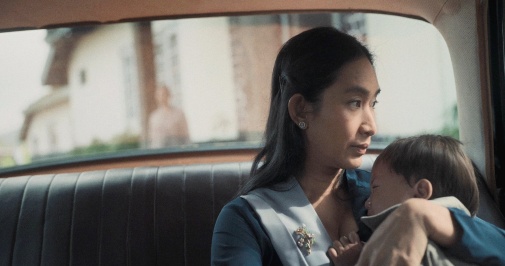
Are you familiar with Kamila Andini's cinema? Before Nana's story, her Yuni was Indonesia's submission for the 94th Academy Awards.